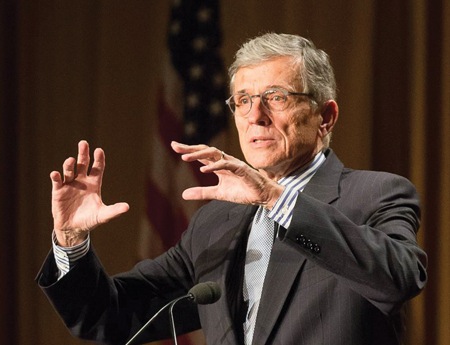FCC's Wheeler: Auctions Are One-Time Opportunity for Broadcasters

The smarter way to stay on top of broadcasting and cable industry. Sign up below
You are now subscribed
Your newsletter sign-up was successful
FCC Chairman Tom Wheeler told a Silicon Valley audience that they need to help pitch broadcasters the "digital opportunity" for their business models in giving up some of their spectrum in an incentive auction, an opportunity he warned would not come again.
"Typically, new technology plows under the old business models,” said Wheeler. “In this case, however, the FCC is overseeing a once-in-a-lifetime opportunity for profitable repurposing of an important business activity.”
He warned against "slavishly" adhering to analog-age spectrum allocation policies that could impede the need to "bring more spectrum capacity to market...and fast."
Wheeler, an amateur communications historian himself, was giving a policy speech at the Computer History Museum in Mountain View, Calif., Thursday.
According to a prepared text, Wheeler plans to spend the first part of his speech making the argument that one of the obstacles the FCC should remove, an obstacle that risks stunting market dynamism, is "government-mandated misallocation of spectrum."
Wheeler was not saying that spectrum in broadcasters hands was misallocated, but that a regime that put broadcasters in a spectrum "silo" was inflexible and outdated.
"Historically, the government allocated spectrum for specific uses or applications. The realities of analog transmission meant that each application, whether television broadcasting or a walkie-talkie, required its own assigned chunk of spectrum. As the IP revolution has meant that a voice call looks just like a television show–a collection of 0s and 1s–the analog-inspired spectrum silos have become an impediment to advancement," Wheeler says. "Put another way, one of the revolutions through which we are living is the reworking of analog spectrum concepts to the new digital realities. Slavishly sticking to analog age concepts of spectrum allocation can become, in the digital age, a government-imposed chokepoint that burdens competition and innovation by creating unnecessary and artificial scarcity of this essential resource. The spectrum allocation chart is chock-full of allocation decisions made on analog concepts that are no longer valid today."
The smarter way to stay on top of broadcasting and cable industry. Sign up below
But to free up spectrum for flexible use in an incentive auction—scheduled for 2015—the FCC needs wiling broadcast sellers.
Wheeler inserted what he said was a "commercial message"—a "once in a lifetime opportunity"—advertising the benefits of a broadcaster giving up some, not all, of its spectrum. Elaborating on a point he made at the International CES Show in Las Vegas Wednesday, he made the following pitch:
"Discussion of the auction has seemed to focus on those broadcasters who may find it attractive to simply sell their spectrum and exit the business. Obviously, such a decision would facilitate the auction process.
"But there are other options that are presented by the auction as well. One of these is for broadcasters to bolster their balance sheets, reduce capital expenses, and continue their traditional business by sharing a channel with other broadcasters.
"Broadcast licenses are 6 MHz of spectrum–the old amount necessary to transmit an analog waveform. A digital television channel, however, does not require the full 6MHz of spectrum. In the new digital environment that 6MHz of spectrum can deliver 19.4 mbps of throughput–far more than is necessary to transmit a standard definition or even a high definition TV channel. This means that the 6 MHz of spectrum once required for a single analog television channel now provides sufficient capacity for multiple television signals to coexist comfortably. The FCC is changing its rules to allow licensees to share capacity inside that 6 MHz, maintain their broadcast carriage rights on cable (which is 90 percent of their viewing homes anyway), and walk off with a big check from selling their old spectrum."
"I cannot remember a point in history when it has been simpler, safer, or more profitable for an incumbent service provider to take advantage of new technology. Typically, new technology plows under the old business models; in this case, however, the FCC is overseeing a once-in-a-lifetime opportunity for profitable repurposing of an important business activity."
"That this is a once-in-a-lifetime opportunity is not hyperbole. The rebanding associated with this auction is hard enough; when it is done the ability to do it again will be virtually nil. There will not be another round of broadcast incentive auctions."
Wheeler said it would be unreasonable to ask broadcasters to decide what to do without "adequate information" from the FCC, so he said more info would be forthcoming the next few months.
Broadcasters both willing and unwilling to sell have been pushing the FCC for more info on floor prices, bidding rules and station repacking before they decide what their next moves will be.
Wheeler said his remarks should be taken as "the start of a dialog." Broadcasters are almost certain to have a few things to say.
The National Association of Broadcasters has argued that the best way to be a digital player is for broadcasters to hang onto all their spectrum and use it for multiple digital offerings including mobile DTV, multicasting, the next phase of HD and more.
Contributing editor John Eggerton has been an editor and/or writer on media regulation, legislation and policy for over four decades, including covering the FCC, FTC, Congress, the major media trade associations, and the federal courts. In addition to Multichannel News and Broadcasting + Cable, his work has appeared in Radio World, TV Technology, TV Fax, This Week in Consumer Electronics, Variety and the Encyclopedia Britannica.

